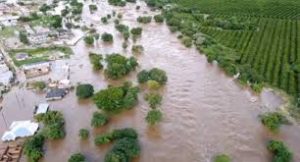 South African authorities declared a National State of Disaster on March 25, 2022, after catastrophic floods ravaged the province of KwaZulu-Natal, leaving extensive damage, loss of life, and displacement of thousands of residents. Torrential rains overwhelmed local infrastructure, destroyed homes, and caused widespread power outages across the region.
South African authorities declared a National State of Disaster on March 25, 2022, after catastrophic floods ravaged the province of KwaZulu-Natal, leaving extensive damage, loss of life, and displacement of thousands of residents. Torrential rains overwhelmed local infrastructure, destroyed homes, and caused widespread power outages across the region.
Devastation and Impact
The floods, which began earlier this week, intensified rapidly, leaving vast areas of KwaZulu-Natal submerged. Local officials reported that heavy rainfall over several days caused rivers and dams to overflow, inundating residential and commercial areas, roadways, and public infrastructure. Numerous communities have been cut off, with rescue operations underway as authorities work to reach stranded residents.
According to the South African Weather Service, the rains reached unprecedented levels, with recorded rainfall exceeding annual averages in a matter of days. The scale of the flooding has led to extensive property damage, disruption of essential services, and significant losses within the agricultural sector. Initial reports from emergency responders confirmed multiple fatalities, although exact numbers remain under verification as efforts continue.
Emergency Response and Evacuations
In response, South African President Cyril Ramaphosa authorized emergency relief measures, directing resources toward immediate rescue and recovery operations in KwaZulu-Natal. Search and rescue teams, assisted by military personnel, were deployed across affected areas to assist with evacuations, while aid agencies mobilized to provide shelter, food, and medical support to displaced residents.
Several emergency shelters have been established to house those affected by the floods, with support from non-governmental organizations and local volunteers. According to government officials, additional resources will be allocated to stabilize damaged infrastructure and prevent further casualties.
Infrastructure and Economic Impact
The floods have also significantly impacted KwaZulu-Natal’s infrastructure, with numerous roads and bridges damaged or rendered impassable. Electricity outages continue in many regions, compounding challenges for both residents and emergency responders. Local authorities have warned of potential contamination risks to water sources, advising residents to take precautions until repairs are made.
KwaZulu-Natal is a critical region for South Africa’s economy, particularly in logistics and trade, as it hosts the port city of Durban. Early estimates suggest the economic toll from the floods could be severe, with potential long-term impacts on businesses and employment.
Ongoing Efforts and Public Safety
The government urges residents in affected regions to remain cautious and follow updates from local authorities. Weather forecasts predict potential rainfall in the coming days, which could hamper recovery efforts.
South African authorities have requested that the international community be prepared for potential aid coordination in the event of additional flooding. Updates on emergency operations and assistance measures are expected in the coming days as relief efforts intensify,.


















